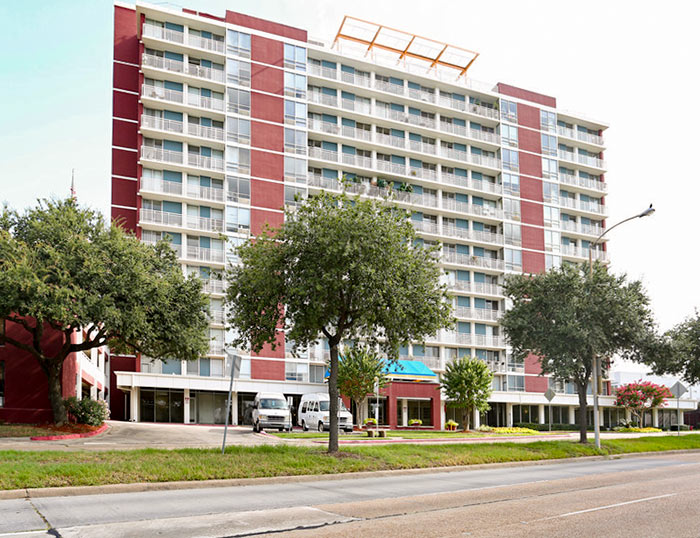
A notice sent yesterday to all tenants of the 2100 Memorial senior-living facility just west of Downtown declares that the 14-story former Holiday Inn has been rendered “totally unusable for residential purposes” in the aftermath of Hurricane Harvey. All 198 elderly residents have been given 5 days to remove themselves and their belongings from their apartments.
The building is a tax-credit property of the Houston Housing Authority that includes both low-income and market-rate units. The notice, which came from V.J. Memorial Corp., a nonprofit entity owned by the authority, states that the company only recently learned that the building’s electrical and fire control systems were compromised by the flooding.
“Due to the damage and health & safety reasons, the building is uninhabitable and we must exercise our right under your lease to terminate the lease effective September 23, 2017,” reads the notice, a copy of which was obtained by Swamplot. A separate lease termination document sent in by a reader declares that “the damage to the Apartment is so extensive the Apartment has become as a practical matter totally unusable for residential purposes due to health and safety reasons. Furthermore, the damage could cause health and safety hazards to you and your family, if you returned to live in the Apartment in its present condition.” Residents have until 5 pm on the 23rd to get out: “If you do not remove your personal possessions by that time. we will be forced to remove your possessions and store them at a cost to you,” the document states.
***
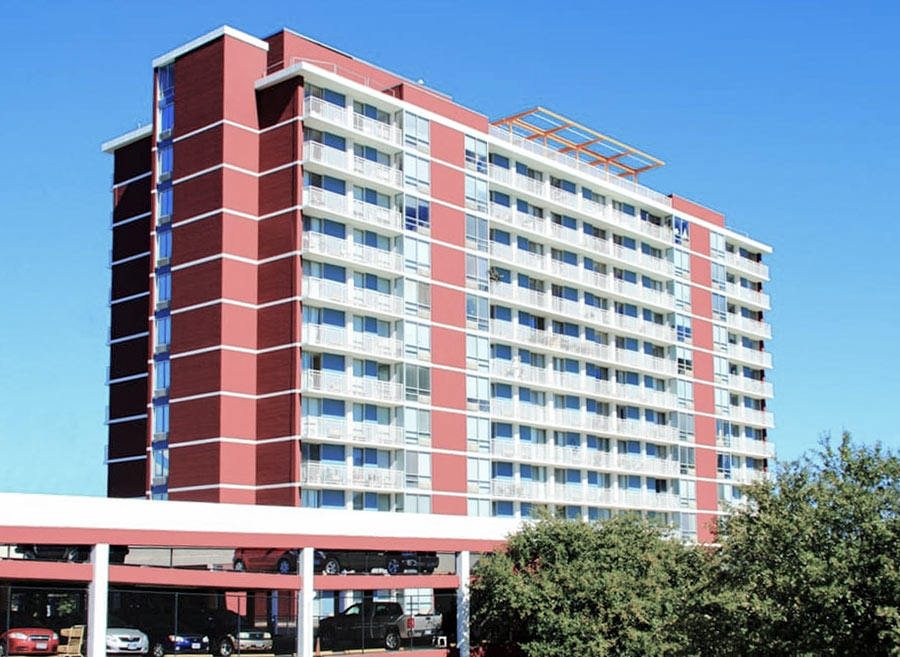
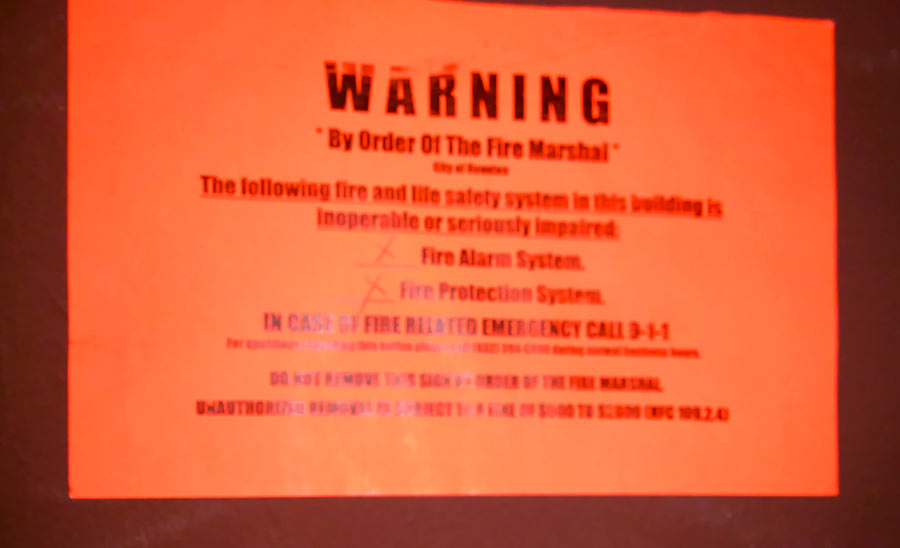 The extent of the building’s damages may not have been apparent to residents in the immediate aftermath of the storm: Though floodwaters from adjacent Buffalo Bayou filled the building’s first floor up to the 5-ft. level, knocking out water service in the building and spurring 20 residents to seek temporary shelter at the George R. Brown convention center, most residents remained in the building — no living units are on the first floor — and water service was restored within days. A red warning tag (above) indicating the building’s fire alarm and fire protection systems were “inoperable or seriously impaired” was placed by an inspector late last week near the building’s construction entrance, where it may not have been seen by most residents, according to a reader; residents now use a new entrance on the building’s second floor. Here’s a photo showing the placement of that tag:
The extent of the building’s damages may not have been apparent to residents in the immediate aftermath of the storm: Though floodwaters from adjacent Buffalo Bayou filled the building’s first floor up to the 5-ft. level, knocking out water service in the building and spurring 20 residents to seek temporary shelter at the George R. Brown convention center, most residents remained in the building — no living units are on the first floor — and water service was restored within days. A red warning tag (above) indicating the building’s fire alarm and fire protection systems were “inoperable or seriously impaired” was placed by an inspector late last week near the building’s construction entrance, where it may not have been seen by most residents, according to a reader; residents now use a new entrance on the building’s second floor. Here’s a photo showing the placement of that tag:

Representatives of Lynd, the company that manages the building, will be on site to answer questions, according to the notice sent to residents. FEMA representatives are scheduled to be available at the building today at noon.
Here’s the notice:
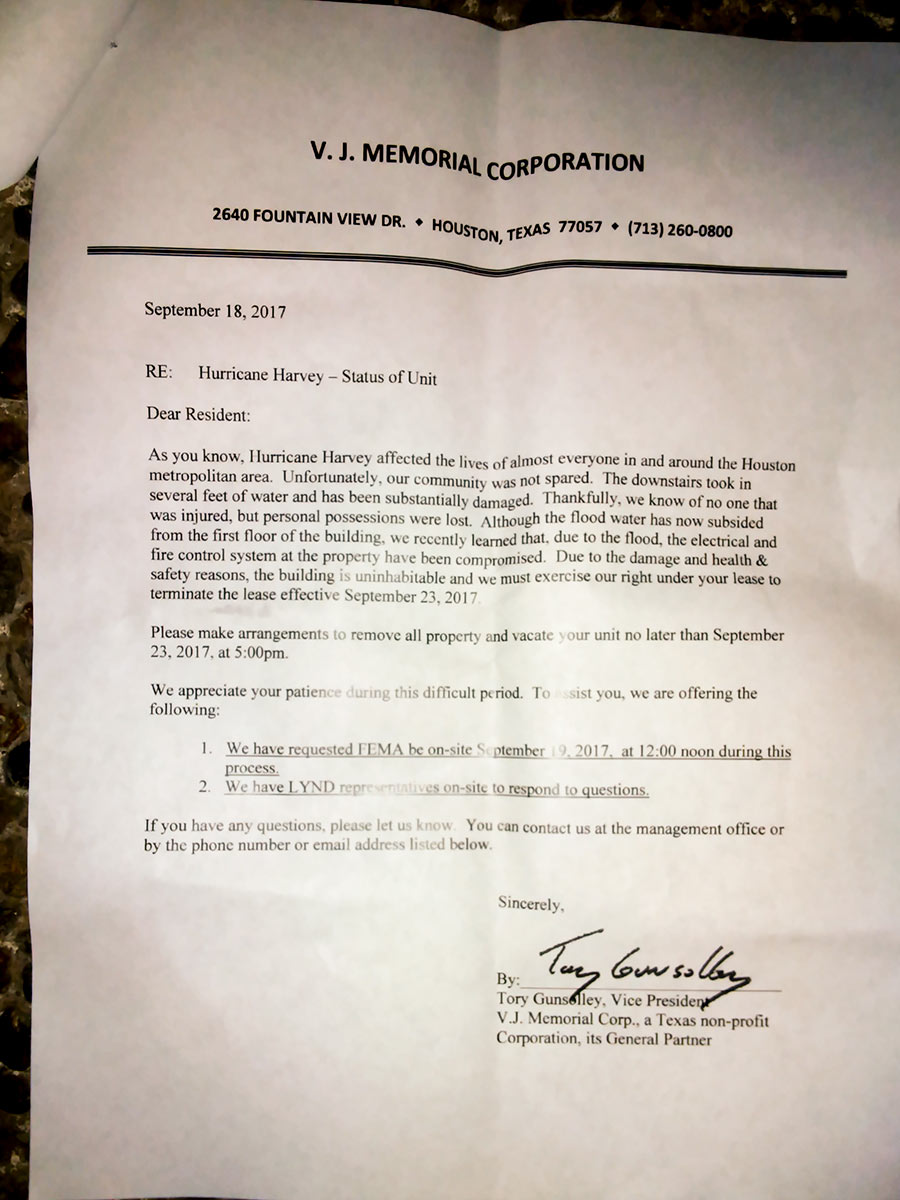
And a lease termination document:
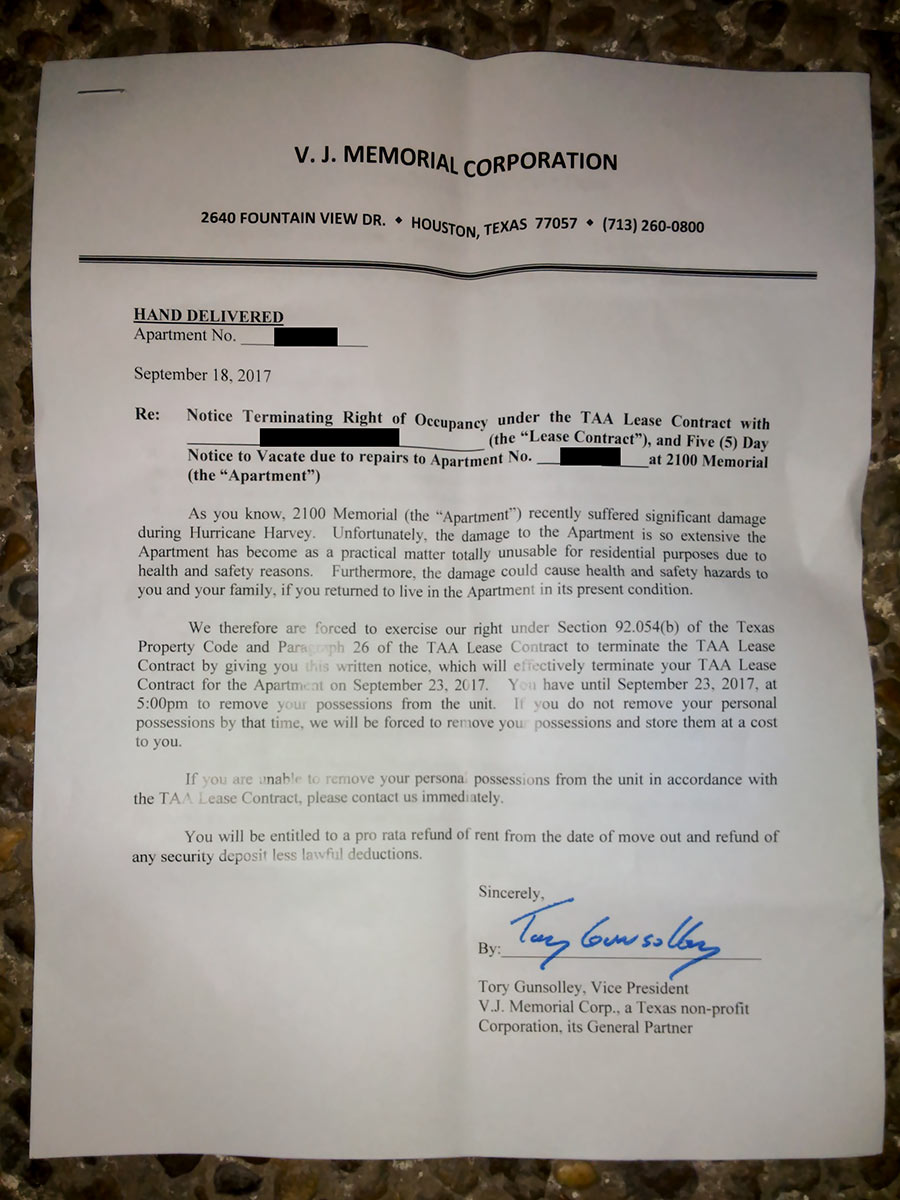
Images: Swamplot inbox (tags and notices); Apartments.com (top photo); 2100 Memorial (second photo)





Wonder if rates will be higher when they reopen :(
This just brings into focus how landlord tenant law is totally inefficient when it comes to natural disasters. When a landlord cannot repair the leasehold in a timely manor, they have no choice but to terminate the leases. While it certainly makes sense that you would want to free people from having to pay rent on a residence that was not habitable, the unintended consequence is that people are uprooted from their community and scattered about the city with little chance of returning to their homes. Likewise, landlords are forced to empty out their premises and pray that they will be able to fill up their building once renovations are completed. Why not give the landlord the option to obtain temporary housing for tenants and keep the lease in place. When repairs are complete, the tenants can move back in without worrying about breaking a lease and do not have to compete with other tenants for space. Tenants could keep their address, which is very helpful for getting credit.
My MIL is getting all her clothes and personal things out but leaving her furniture behind. Lawyers – can they/will they really charge her for storing them?
“Besides, there are investment companies lined up to build micro apartments for young professionals who want to work close home and enjoy all the fancy amenities (such as beaches) found in Buffalo Bayou Park. We could always build some cheap new units on some cheap land near the airport.” the document also states.
This is seriously messed up. I’ve heard that the issue is that the fire panel was damaged and a new one has been ordered. They are having to do fire watch, but otherwise have electricity, water etc. I think VMel is onto something, they want to do a high end building here.
The building should be repaired and the seniors allowed to stay.
Come on, Houston Housing Authority, you’re better than that. This notice bears a strong FU essence.
Being that the Housing Authority of the City of Houston owns the building, I am sure this isn’t a gambit to kick out the poor and build a new high end high rise.
It’s been how long since these apartments flooded – two weeks, maybe more?
And the HHA is just now taking measures to ‘protect’ the tenants by throwing them out on the street?
Must be fun to be a low-income elderly person who has to find affordable housing in a suddenly tight market, come up with deposits and moving costs, and pack a lifetime of possessions in less than five days.
This comes as no surprise. I have an 81 year old friend who lives at Allen Parkway Village, and his reports of HHA’s management reflect a mixture of indifference, inefficiency, and outright malice. This is an agency in dire need of reform.
@Old School – Most landlords do not have just happen to own a similar-sized empty building to which they can move a dozens or hundreds of tenants. Having to terminate the leases for the entire building for repairs is not a decision that any landlord would take lightly. Insurance would only cover some of the lost rent if the insurance agrees that the building was unihabitable and, even then, there will be limits on that coverage. Then, the landlord will spend a bunch of money to do major repairs to the building, and spend a lot of time trying to get the building re-rented.
Most likely, the electrical and fire control problems are extensive, and, with seniors in the building, the liability for potentially having a fire and a non-working fire sprinkler are not worth the risk. They also might have mold problems depending on how well they could air out the bottom floor and how long the air conditioning was out.
@Wylie: Landlord does not have to use their own property. They could contract with another complex/landlord for temporary housing. The landlord will be able to get better terms than would an individual renter trying to find temporary housing. Any extra expense to the landlord would be offset by being able to have everyone come back when repairs are completed instead of having to go back out on the market to find tenants.
I don’t believe for a second the HHA is acting in the best interest of the residents. Some developer lined some pockets to motivate the city to sell the property, just watch. After it sits there a few months surrounded by chain link fencing and being an eyesore Sly Turner will suddenly announce the building has been sold because the city needs the $$$, and F-U to all the seniors that end up homeless. Wait for it.
@OldSchool this is more complicated for landlords than many would think. Most loans include leasing covenants by the landlord that limit “corporate leases” (leasing multiple units to a single person or entity), prescribe certain lease forms, and set a minimum lease term. For example, multi-family properties with Fannie Mae loans cannot write leases with a term of less than six months without getting a waiver (which ain’t easy). Sometimes intentionally violating those covenants can trigger personal liability for the landlord’s key officers. All of this makes it more difficult for landlords to try to make deals like you suggest.
Jules: Or the city can be ham handed and saying “YOU MUST CLOSE!”. Most people that run a building don’t want to kick out paying tenants for the heck of it. This is a VERY expensive (in terms of lost rent) process for owners.
I still don’t get why so many people are at GRB. Unless they were not paying rent where they were staying, why not just rent somewhere else? I realize that might sound easier said than done but it’s really not. I know because I rent out property. It’s not that hard to get an apartment. You see a listing, you say “I’d like to rent”, you apply, and so long as there isn’t anything crazy on the app, you pay your rent and move in. The only argument I could see is coming up with a deposit but honestly that’s normally, at most, one months rent. And if you’re getting the boot, you can likely get that from your previous property (if not friends/family). And if you’ve saved a month of rent by staying at GRB and not paying utils, you already have it.
@Cody,
.
> so long as there isn’t anything crazy on the app
.
Maybe that’s the problem. Could be as simple as pets, or as problematic as prison record or bad credit.
I’ve volunteered there and can tell you the entire “sub-basement” electrical/fire control room was completely submerged. I assume that entities receiving govt rent subsidies must meet current NEC (nat’l elect contractor) standards on renovations/repairspilp. Thus, if entire elect/ fire control room is gutted/replaced then all rooms receptacles, fixtures, elevators, laundries egc etc must be replaced to meet current NEC also. I doubt you can “scab on” new equipment to decades old equipment on a major renovations. Would you trust it?
You can’t make this type of systemic overhaul while resisdents stay in their unflooded upper floor apts. Unfortunately, for their safety they must be moved ASAP. The existing lights and limited A/C are being run off of generators. You can’t run a hi-rise indefinitely on generators.
God forbid a fire breaks out or an elevator fails due to faulty electrical system. Help is needed now finding affordable & safe housing, transport and followup assistance. Hard enough in “normal” times but that much more difficult post-Harvey.
That all sounds plausible, but aren’t there people living all over the city in flood-damaged houses that are now not code-compliant? Isn’t there some variance or middle ground to proceed with repairs as expeditiously as possible? And is rewiring the whole building to modern NEC really the only option? I’m guessing most of the upper floor wiring and switchgear is fine. I get that governmental entities don’t want to be perceived as cutting corners where safety is concerned (as in Grenfell Tower) but isn’t there some way to keep from having to move all those people?